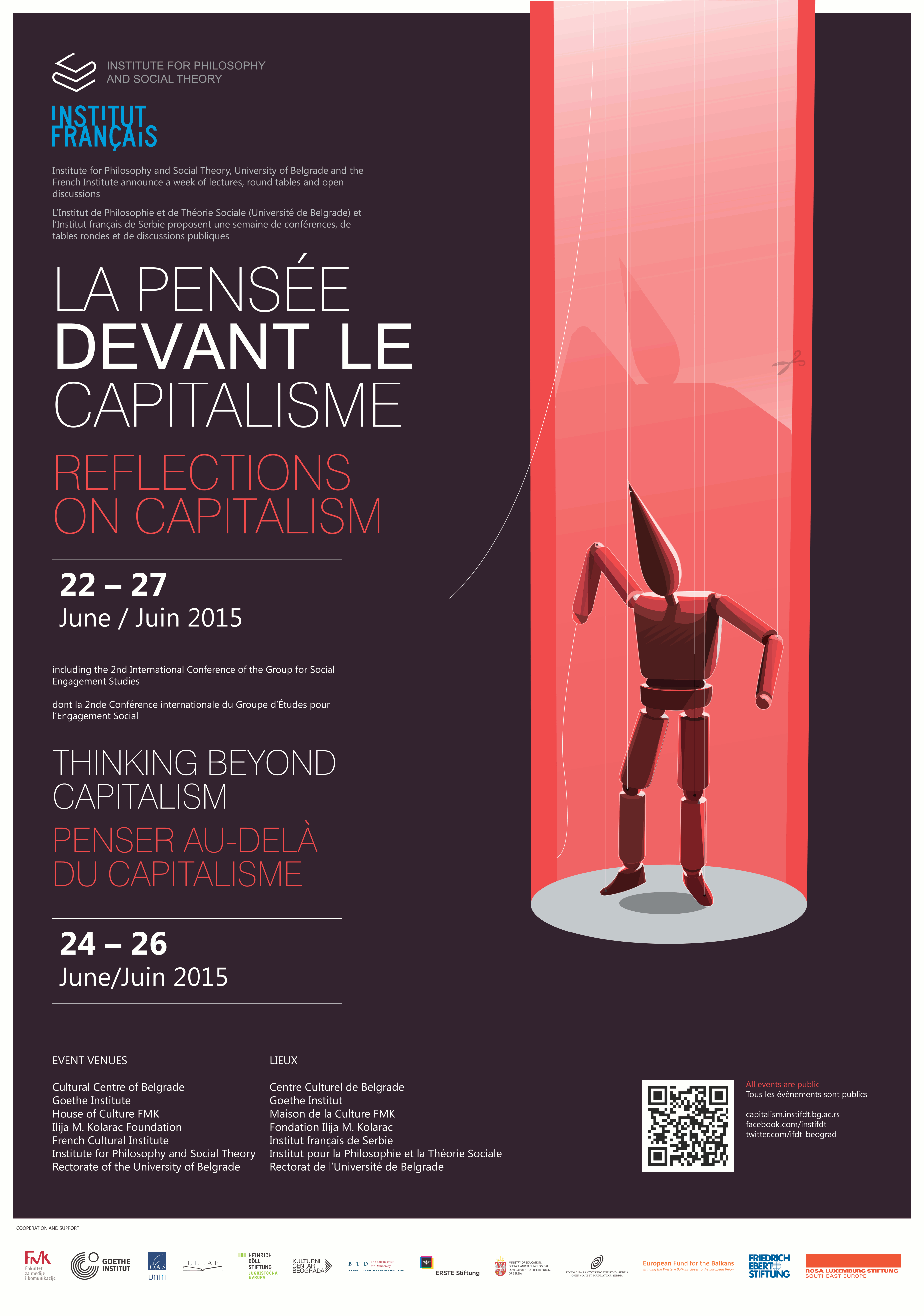Thinking Beyond Capitalism
.jpg)
The Institute for Philosophy and Social Theory in Belgrade in cooperation with the French Institute in Serbia are announcing the start of the international program "Reflections on Capitalism" from June 22nd – 27th this year. The program will include keynote lectures, round tables and seminars, and the conference "Thinking Beyond Capitalism" which will last from June 24th – 26th. The events will bring together dozens of leading philosophers, sociologists and economists, and more than 70 lecturers from around the world. All events are public.
One often hears the argument that the matters of economy are matters of experts, and that its social impact should not be dealt with by those not in possession of this expertise. In fact, the “non-experts” –excluded citizens, workers, minorities and the precarious workforce – should think about it in strictly given terms, if at all. However, after the outbreak of the crisis in 2008, it became clear that the functioning of the world economy concerns us all, and that the social analyses and the theories of crisis must be of public importance as well.
The Institute of Philosophy and Social Theory has therefore decided to pose, through public discussions and with some of the world's leading philosophers, sociologists and economists, several key questions. First, how is it possible to speak of contemporary capitalism at all? How do we understand today's economic situation, when there is not even an agreement about whether the financial crisis is just a temporary occurrence or a symptom of a deeper crisis of capitalism itself? Moreover, even the word "crisis" has an ambiguous character: it suggests an existence of a better situation before the crisis and in which the system was operating normally, where everything was fine, and after which the current situation appeared as something that does not belong to the rationality of the capitalist system. However, as is well known, during its history, capitalism proved to be prone to crises in a fundamental sense. Only in the last 100 years, from the early twenties, mid-seventies and then at the end of the 2000’s, capitalism has gone through three major crises that have affected people throughout the world. What will then become of the present one?
In the Communist Manifesto, Marx wrote that capitalism is a social system that created itself through a constant critique of other social systems. Capitalism has surpassed all of its rivals: it destroyed the ancien régime, made social connection flexible and continuously revolutionized the means of production: it is a system in which ‘all that is solid melts into air, all that is holy is profaned’. To what extent then, is it possible to criticize such a system, a system that incorporates the critique itself? If capitalism is imposed as a necessary framework of our thinking, how do we think beyond capitalism?
Perhaps the crises are not situations which arrest thought, but necessitate it.
Confirmed speakers include: Anselm Jappe (Collège international de philosophie, Paris), Alex Demirovic (Universität Frankfurt am Main, visiting professor), Catherine Samary (Université Paris Dauphine), G. M. Tamás (CEU, visiting professor, Budapest), Gérard Duménil (Université Paris 10, Paris), Mladen Lazić (University of Belgrade), Toni Prug (Queen Mary University of London), Ugo Mattei (University of California, Hastings College of the Law / Università di Torino), Yann Moulier-Boutang (Université Technologique de Compiègne), and many others.
The program will take place at several locations in the city, at the following locations:
- Goethe Institute – Knez Mihaila 50
- House of Culture, FMK – Terazije 34
- Institute for Philosophy and Social Theory – Kraljice Natalije 45
- French Institute in Serbia – Knez Mihailova 31
- Ilija M. Kolarac Foundation – Studentski Trg 5
- Rectorate of the University of Belgrade – Studentski Trg 1
- Cultural Centre of Belgrade – Trg Republike 5
All events within the program are free of charge and open to all.
For information, please visit:
The Conference Website / Facebook event / Contact us at: ifdt.capitalism@gmail.com

